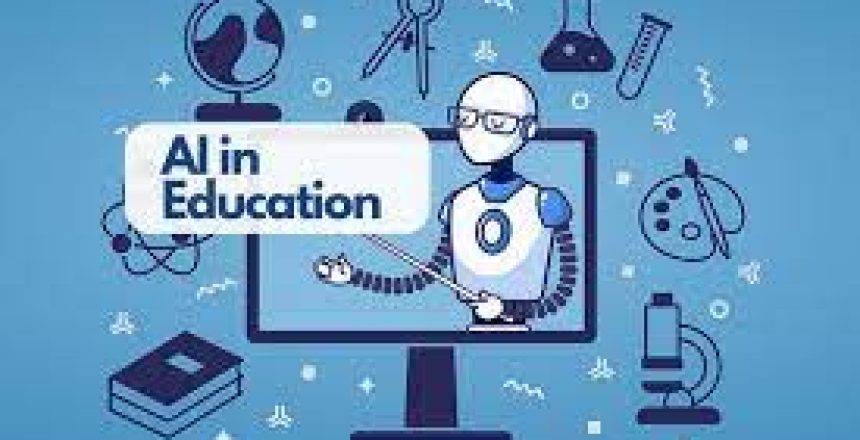In the rapidly advancing landscape of education, the integration of artificial intelligence (AI) has emerged as a transformative force, reshaping the way students learn, teachers instruct, and educational institutions operate. This blog delves into the multifaceted impact of AI in education, exploring its potential to enhance personalized learning, streamline administrative processes, address learning gaps, and prepare the next generation for the challenges of the future.
I. Personalized Learning Through AI:
One of the key promises of AI in education lies in its ability to facilitate personalized learning experiences tailored to individual student needs.
- Adaptive Learning Platforms:
- AI-powered adaptive learning platforms analyze student performance data to customize the pace and content of instruction. This ensures that students receive targeted support and challenges based on their individual strengths and weaknesses.
- Intelligent Tutoring Systems:
- AI-driven tutoring systems offer real-time feedback and guidance, mimicking the role of a personal tutor. These systems adapt to each student’s learning style, providing additional resources or alternative explanations to reinforce understanding.
- Customized Learning Paths:
- AI algorithms analyze students’ progress and preferences to generate personalized learning paths. This approach allows students to explore topics of interest, fostering a sense of autonomy and engagement in their educational journey.
II. Streamlining Administrative Processes:
Beyond the classroom, AI plays a crucial role in streamlining administrative tasks, allowing educational institutions to operate more efficiently.
- Automated Grading and Assessment:
- AI-powered tools automate the grading and assessment process, saving educators valuable time. This automation enables teachers to focus on more strategic aspects of teaching, such as providing targeted feedback and developing innovative instructional methods.
- Predictive Analytics for Student Success:
- AI algorithms analyze historical data to identify patterns that can predict student success or potential challenges. This proactive approach allows educators to intervene early, providing additional support to students who may be at risk of falling behind.
- Resource Allocation Optimization:
- AI helps institutions optimize resource allocation by analyzing data on classroom usage, staffing patterns, and student demand. This enables better planning for facilities, staffing, and course offerings.
III. Addressing Learning Gaps and Enhancing Inclusivity:
AI has the potential to bridge learning gaps and foster inclusivity by providing targeted interventions and accommodations.
- Individualized Support for Diverse Learning Styles:
- AI algorithms can identify diverse learning styles and preferences, allowing educators to tailor instructional methods to accommodate different ways in which students absorb and process information.
- Language Processing for Accessibility:
- AI-driven language processing tools assist students with language-related challenges. These tools can provide real-time language translation, transcription services, and assistive technologies to enhance accessibility for all students.
- Early Intervention for Special Education:
- AI facilitates early detection of learning disabilities and developmental challenges, enabling timely interventions and personalized support for students with special needs.
IV. Preparing the Next Generation for the Future:
As we navigate an era of rapid technological advancements, AI in education plays a crucial role in equipping students with the skills and knowledge needed for the future.
- Emphasis on Critical Thinking and Creativity:
- AI takes over routine tasks, allowing educators to focus on cultivating critical thinking, problem-solving, and creativity in students. These skills are essential for navigating the complex challenges of the future job market.
- Integration of Coding and Computational Thinking:
- AI-powered tools introduce students to coding and computational thinking, laying the foundation for digital literacy and preparing them for roles in technology-driven industries.
- Exposure to Emerging Technologies:
- AI in education exposes students to emerging technologies, providing hands-on experiences with tools that are shaping industries. This exposure fosters curiosity and adaptability, key attributes for success in a rapidly evolving technological landscape.
V. Ethical Considerations and Challenges:
While the integration of AI in education brings immense potential, it also raises ethical considerations and challenges that must be carefully addressed.
- Data Privacy and Security:
- The collection and analysis of student data by AI systems raise concerns about data privacy and security. Educational institutions must implement robust measures to safeguard sensitive information and ensure compliance with data protection regulations.
- Algorithmic Bias:
- AI algorithms may inadvertently perpetuate biases present in training data. Educators and developers must actively work to identify and mitigate algorithmic bias to ensure fair and equitable outcomes for all students.
- Digital Literacy and Responsible AI Use:
- It is essential to educate students about AI, fostering digital literacy and responsible use of AI technologies. This includes understanding how algorithms work, recognizing the ethical implications of AI, and promoting responsible AI practices.
VI. Future Possibilities and Continuous Innovation:
Looking ahead, the integration of AI education is poised for continuous innovation, offering new possibilities for enhanced learning experiences and institutional efficiency.
- Collaborative Learning Environments:
- AI can facilitate collaborative learning environments by analyzing student interactions and preferences, fostering peer-to-peer learning, and promoting teamwork in virtual and physical spaces.
- AI-Powered Learning Analytics:
- The use of AI in learning analytics will continue to evolve, providing educators with deeper insights into student performance, engagement, and areas for improvement. This data-driven approach enables continuous improvement in instructional strategies.
- Incorporation of Virtual and Augmented Reality:
- Virtual and augmented reality, powered by AI, will play a more prominent role in creating immersive educational experiences. These technologies can transport students to virtual environments, enhancing their understanding of complex concepts.
Conclusion:
Artificial intelligence is undeniably shaping the next generation of education, ushering in a new era of personalized learning, administrative efficiency, inclusivity, and future-ready skill development. As we navigate the integration of AI in education, it is essential to remain vigilant about ethical considerations, promote digital literacy, and ensure that the transformative power of AI is harnessed responsibly. The evolving landscape of education, enriched by AI, holds the promise of a more dynamic, accessible, and effective learning experience for students around the globe. As educators, policymakers, and technologists collaborate, the journey towards a technologically empowered educational future unfolds, with the potential to unlock the full potential of every learner.
